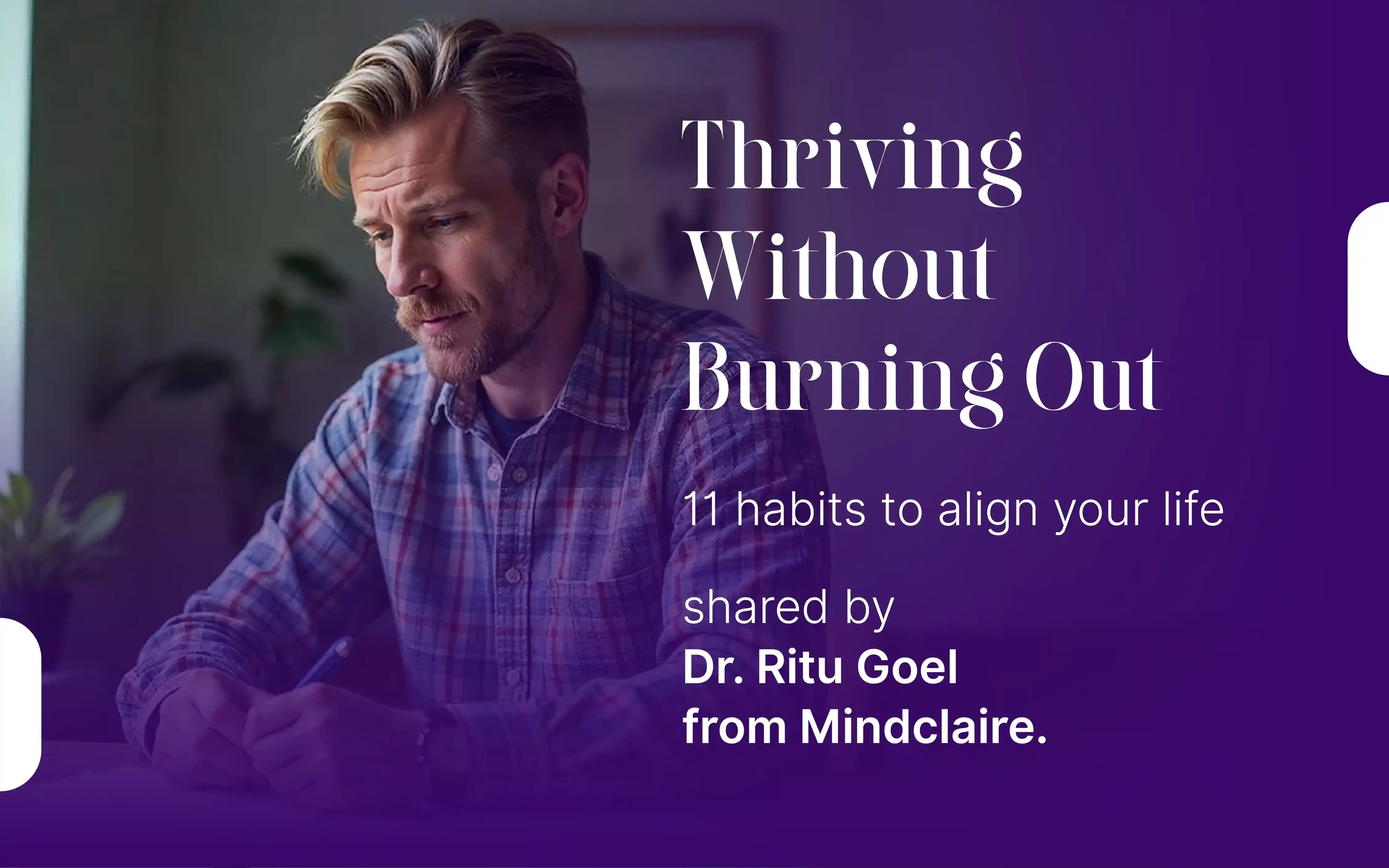by Dr. Ritu Goel | May 14, 2025 | Blogs | 0 comments

Why It Matters: In a distracted world, giving one task your full attention unlocks creativity and productivity. Research shows that multitasking reduces efficiency by up to 40% (American Psychological Association).
How to Get Started: Choose one key task each day and dedicate a 25-minute block to it, free from notifications. For example, if you’re writing a report, silence your phone and focus solely on that. You’ll be amazed at what you accomplish.
Mini-Example: Picture yourself drafting an email without checking social media every five minutes—suddenly, it’s done in half the time.
Why It Matters: Starting your day with intention aligns your actions with your values, reducing stress and boosting satisfaction.
How to Get Started: Spend 5 minutes each morning asking, “What truly matters today?” Write down one priority that reflects your core values, like connection or growth.
Mini-Example: Before diving into work, jot down “Call a friend to check in” to prioritize relationships over tasks.
Why It Matters: Your energy fluctuates naturally, and working with those rhythms optimizes performance. Studies suggest aligning tasks with energy peaks improves outcomes (Healthline).
How to Get Started: Notice when you feel most alert (e.g., morning or afternoon) and schedule demanding tasks then. Save routine work for energy lows.
Mini-Example: If you’re sharpest at 10 a.m., tackle that big presentation then, not during your 3 p.m. slump.
Why It Matters: Saying no protects your peace and energy, preventing burnout. Setting boundaries is linked to better mental health (Mayo Clinic Health System).
How to Get Started: Practice declining non-essential requests politely, e.g., “I’d love to help, but I need to focus on my current priorities.”
Mini-Example: When a colleague asks you to join an extra project, say no gracefully to preserve time for your family.
Why It Matters: Listening to understand, rather than to fix, builds trust and deepens relationships. Empathy enhances workplace collaboration (Positive Psychology).
How to Get Started: In conversations, focus on the speaker’s words without planning your response. Reflect what you hear, like, “It sounds like you’re feeling overwhelmed.”
Mini-Example: When a friend vents about stress, just listen and nod instead of jumping in with solutions—they’ll feel truly heard.
Why It Matters: Strong social connections are a buffer against stress and a source of inspiration.
How to Get Started: Schedule regular check-ins with people who uplift you, like a weekly coffee with a mentor or a call with a close friend.Mini-Example:
Mini-Example: Text a colleague who always inspires you to grab lunch—it’s a small step that recharges you both.
Why It Matters: Decisions rooted in your values reduce second-guessing and bring confidence.
How to Get Started: Before making a choice, ask, “Does this align with what I value most, like integrity or family?”
Mini-Example: When offered a high-paying job that requires constant travel, decline if family time is your priority.
Why It Matters: Adapting to change builds resilience, keeping you balanced in uncertainty.
How to Get Started: When plans shift, take a deep breath and focus on one actionable next step.
Mini-Example: If a meeting gets rescheduled, adjust your day calmly instead of stressing—it’s a chance to regroup.
Why It Matters: Physical health fuels mental clarity and emotional resilience. Regular exercise can reduce depression symptoms by up to 30% (Healthline).Physical health fuels mental clarity and emotional resilience. Regular exercise can reduce depression symptoms by up to 30% (Healthline).
How to Get Started: Aim for 30 minutes of daily movement (e.g., walking, yoga), eat mood-boosting foods (e.g., berries, salmon), and sleep 7–9 hours nightly.
Mini-Example: Swap one coffee break for a brisk walk and notice how your focus sharpens afterward.
Why It Matters: Rest resets your mind, boosting creativity and productivity. A study found breaks increase output by 75% (BioSpace).
How to Get Started: Schedule a 5–10 minute break every hour to stretch, breathe, or step away.
Mini-Example: After an hour of work, stand up, stretch, and sip water—it’s like hitting reset on your brain.
Why It Matters: Gratitude shifts your perspective, enhancing happiness and resilience. Daily gratitude practices improve well-being (NIH Emotional Wellness Toolkit).
How to Get Started: Write down 3–5 things you’re grateful for each evening, from small wins to big moments.
Mini-Example: Before bed, note “I’m grateful for a kind coworker” or “I finished that tough task”—it feels grounding.
These habits are powerful, but if you’re struggling with persistent stress or mental health challenges, consider reaching out to a professional. It’s a sign of strength, not weakness (Psychiatry.org).
The top 1% don’t just work harder—they work wiser, prioritizing health, purpose, and clarity. You don’t need to adopt all 11 habits at once. Pick one that resonates, like taking a reflective walk or setting a boundary, and start small. Over time, these shifts create a life that feels aligned and fulfilling.
#MentalWellness #ThrivingNotBurningOut #GrowthMindset #LeadershipHabits